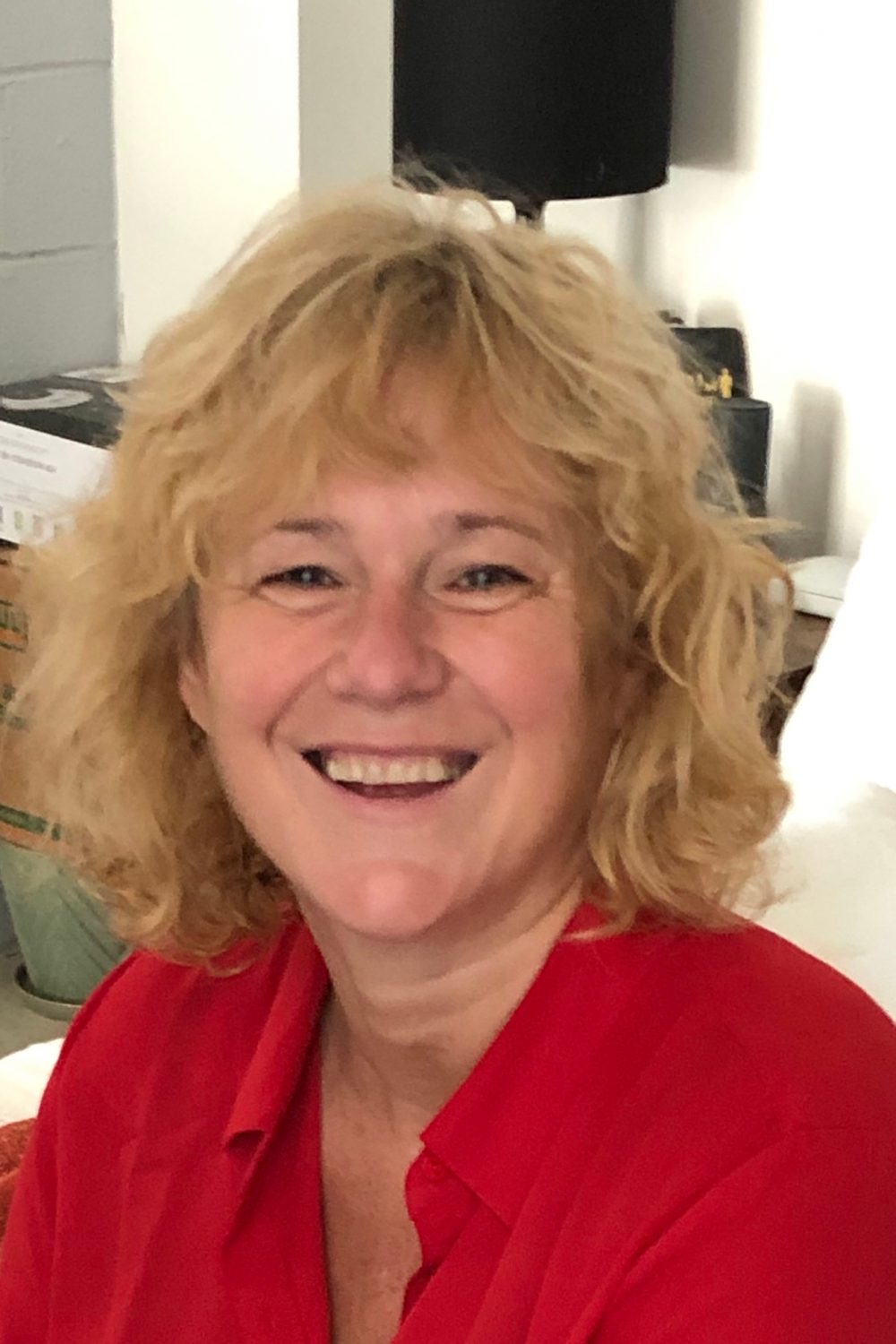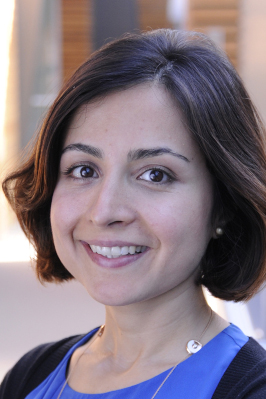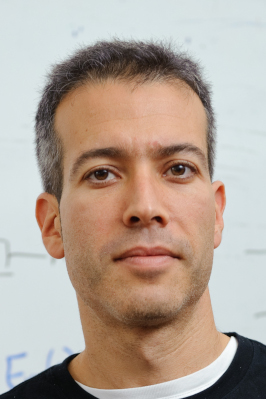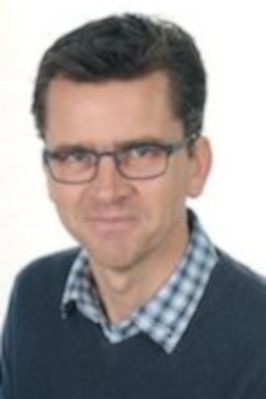Meet our confirmed conference speakers for this year’s conference and find out more about their background and work.

Principal interest(s): The development and deployment of single-cell genomics technologies to understand human development and disease progression
Area(s) of research: Epigenetics, Genomics, Single-cell
Andrew Adey will be giving a talk about “Advances in epigenomic and multi-omic analysis of single cells by combinatorial indexing” on Saturday, June 15.

Area(s) of research: Identification and characterization of genes responsible for monogenic renal disorders.
Corinne Antignac will be giving a talk about “New insights in the genetics of hereditary nephrotic syndromes” on Sunday, June 16.

Principal interest(s): His scientific interest focuses on gametes physiology. He is studying in particular the acrosome reaction, an exocytotic, calcium-dependent event essential for fertilization and sperm flagellum. He is also interested in mRNA control during oogenesis.
Area(s) of research: Currently, he focuses his research on human infertility due to genetic defects. He has characterized several genes, such as DPY19L2 and SPINK2, involved in male infertility due to defective acrosome biogenesis and several genes involved in MMAF syndrome (Multiple Morphological Anomalies of the Flagellum), such as DNAH1, CFAP43, CFAP44, using exomic sequencing and NGS. He recently characterized PATL2 as a new gene involved in oocyte maturation defect in females.
Christophe Arnoult will be giving a talk about “Novel discoveries of genes implicated in male and female infertility” on Tuesday, June 18.

Principal interest(s): genetic counseling, psychiatric genetics
Area(s) of research: psychiatric genetic counseling, genetic counseling outcomes research and stigma
Jehannine Austin will be giving a talk about “Updates in clinical applications of psychiatric genetics” on Sunday, June 16.


Principal interest(s): Molecular and physiopathological basis of neurodevelopmental epilepsies
Area(s) of research: Somatic mutations in malformations of the cortical development, NGS in familial focal epilepsies, iPSCs, and animal models
Stephanie Baulac will be giving a talk about “Somatic mutations of the mTOR pathway in focal epilepsies” on Monday, June 17.

Principal interest(s): Ethical issues concerning women’s reproductive health, assisted human reproduction, embryo research, and research involving pregnant women
Area(s) of research: Baylis’ area of expertise is ethics and her work is at the intersection of policy and practice. Her current research focuses ethics and human genome editing.
Françoise Baylis will be giving a talk about “CRISPR Babies: Our Cells/Ourselves” on Monday, June 17.



Principal interest(s): Medical Epigenomics, Bioinformatics & ML/AI, Single-cell Sequencing
Cancer Immunology and CRISPR Technology
Area(s) of research: His research group combines high-throughput experimental biology (genome sequencing, epigenetics, CRISPR screening, systems & synthetic biology) with computational research (bioinformatics, machine learning, artificial intelligence), in order to dissect immune regulation and to improve diagnosis and therapy for cancer and immune disease.
Christoph Bock will be giving a talk about “Pooled CRISPR screening with single-cell transcriptome readout” on Sunday, June 16.

Principal interest(s): Integrating genomic and other –omic technologies to improve our understanding of rare disease, with a particular focus on solving the unsolved and most difficult rare diseases.
Area(s) of research: rare diseases, genomics, other ‘omics, gene discovery, data sharing, health services, model organisms.
Kym Boycott will be giving a talk about “Challenges and solutions to advance collaboration in rare disease research, diagnostics and therapy” on Tuesday, June 18.

Principal interest(s): Transposable elements in human disease
Area(s) of research: Interspersed repeat expression analysis, mobile element insertion site mapping, structural variation, genetic disease, cancer genetics, cancer biology
Kathleen Burns will be giving a talk about “Insertion variants at disease risk loci” on Sunday, June 16.

Principal interest(s): PIK3CA/AKT/mTOR pathway and rare diseases
Guillaume Canaud will be giving a talk about “Targeted therapy in patients with PIK3CA-related overgrowth syndrome” on Saturday, June 15.

Principal interest(s): The development of methods to discover and genotype human variation using novel sequencing data.
Area(s) of research: Computational Biology, Bioinformatics, Algorithm Development, Structural Variation.
Mark Chaisson will be giving a talk about “Resolving human genetic variation with long-read single-molecule sequencing” on Saturday, June 15.

Principal interest(s): Molecular therapy; gene augmentation; splicing modulation
Area(s) of research: Development of Molecular Therapies for Inherited Retinal Diseases
Rob Collin will be giving a talk about “Restoring splicing defects by antisense oligonucleotide therapy” on Sunday, June 16.

Principal interest(s): Gene regulation during human organogenesis. Non-coding variation and human disease. Evolution of gene regulation and species specific phenotypes.
Area(s) of research: Epigenomics, transcriptomics, and chromatin architecture in mammalian development.
Justin Cotney will be giving a talk about “Advances in epigenomic and multi-omic analysis of single cells by combinatorial indexing” on Saturday, June 15. is an assistant professor of Molecular & Medical Genetics at the department of Molecular and Medical Genetics at the Oregon Health and Science University in Portland, United States.
Principal interest(s): The development and deployment of single-cell genomics technologies to understand human development and disease progression
Area(s) of research: Epigenetics, Genomics, Single-cell
Justin Cotney will be giving a talk on Tuesday, June 18.

Principal interest(s): Dr Crepaz-Keay has written and spoken widely on mental health service user, carer and broader public engagement. A former psychiatric patient, he has maintained a strong focus on challenging discrimination. More recently Dr Crepaz-Keay has specialised in public mental health and mental health literacy as key tools for improving lay engagement in complicated fields. Driven by understanding and developing ethics and values in psychiatry, he has engaged in psychiatric genetics and is a member of the International Society of Psychiatric Genetics Ethics Committee.
Area(s) of research: Self-management and peer support, patient experience, big data, ethics and values, public mental health, mental health literacy.
David Crepaz-Keay will be giving a talk about “Current understanding of psychiatric genetics research and services amongst mental health service users and their families” on Sunday, June 16.

Area(s) of research: His research has pioneered understanding of the causes and alleviation of health inequalities; lifecourse epidemiology; systematic reviewing of epidemiological evidence; and the study of population health contributions of the new genetics.
Principal interest(s): He is particularly interested in developing and applying Mendelian randomization approaches, interrogating the causal role of behavioral factors (such as alcohol consumption) and intermediate phenotypes on different health outcomes, such as cardiovascular diseases and type 2 diabetes. He is currently Scientific Director of the Avon Longitudinal Study of Parents and Children.
George Davey-Smith will be giving a talk about “Genetic instruments in mendelian randomization studies” on Monday, June 17.

Principal interest(s): Long-range gene regulation and 3D Genome
Molecular Diagnostics, Non-Invasive Prenatal Diagnosis, Structural Variation in cancer, chromosome conformation capture methods
Area(s) of research: Basic science: Transcription, Chromatin, Epigenetics, 3D Genome
Applied science: NIPD, chromosome rearrangement detection in cancer
Wouter De Laat will be giving a talk about “Regulation of disease-associated gene expression in the 3D genome” on Monday, June 17.

Area(s) of research: She focused her research activities on epidermal stem cells and their use in translational medicine. Laura is directly involved in two phases I/II clinical trials for dystrophic and junctional Epidermolysis Bullosa and her R&D activities in Holostem Terapie Avanzate are dedicated at enhancing and developing ex-vivo epithelial stem cell gene therapy for genetic skin diseases.
Laura De Rosa will be giving a talk about “Regeneration of the entire human epidermis using transgenic stem cells” on Tuesday, June 18.

Principal interest(s): creation of methods and large resources to use electronic health records (EHRs) and other large data sets to better understand the genomic basis of disease and drug response
Area(s) of research: precision medicine, biomedical informatics, genome and phenome analyses, pharmacogenomics, and secondary use of electronic health records (EHRs)
Joshua Charles Denny will be giving a talk about “The NIH All of us program: Building a national research program of 1 million U.S. participants to advance precision medicine” on Tuesday, June 18.

Principal interest(s): Non-invasive in vivo optical imaging technologies to measure metabolism
Area(s) of research: The phasor approach to Fluorescence Lifetime Imaging Microscopy (FLIM), Huntington disease, confocal microscopy and correlation spectroscopy
Michelle Digman will be giving a talk about “In vivo optical imaging and insights into human disease” on Saturday, June 15.

Principal interest(s): Epigenetics/Epigenomics
Area(s) of research: The regulation of gene transcription by RNA polymerase II is critical for development and differentiation, and its misregulation contributes to the pathogenesis of many cancers, including leukemia. The overall goal of our laboratory is to define the molecular mechanisms underlying leukemogenesis and to identify potential targets for therapy through detailed studies of proteins and protein complexes that regulate chromatin modifications, transcription initiation, and transcription elongation.
Delphine Albrecht will be giving a talk about “Enhancer Logic and Mechanics in Development and Disease” on Monday, June 17.

Principal interest(s): Epigenetics/Epigenomics
Area(s) of research: Our group uses advanced technologies in single cell genomics and neuronal tracing to identify both the molecular signatures of individual neuronal cell types in the mammalian brain and their synaptic partners. We use a variety of multi-omic assays including DNA methylation, RNA-seq, chromatin accessibility and 3D structure in single neurons across the brain. These detailed cell atlases reveal novel cellular taxonomy in the brain and elucidate spatial diversification in fine cell subtypes allowing the identification of cell type-specific DNA regulatory elements. From this information, we can infer transcriptional regulatory networks underlying cell diversification. To link these epigenomically defined cell types to the mouse connectome, AAV2retro has been used to label, isolate, and generate single nuclei methylome data from individual projection neurons. Our analyses show that the laminar location, cortical region, and projection targets all contribute to the unique epigenetic signatures of individual neurons.
Joseph Ecker will be giving a talk about “Single Cell Epigenomic Analysis of the Anatomy and Neuronal Circuitry of the Brain” on Tuesday, June 18.



Principal interest(s): Retrotransposons, somatic genome mosaicism, single-cell genomics
Area(s) of research: Neuroscience, neurodegeneration, genetic disease
Geoffrey Faulkner will be giving a talk about “L1 retrotransposition in germline, early embryos and cancer development” on Sunday, June 16.

Principal interest(s): Gene therapy for blood diseases, hemoglobinopathies, hematopoietic stem cell biology, molecular control of erythropoiesis
Area(s) of research: Gene therapy for hemoglobinopathies, HSC-niche interaction, definition of hematopoiesis in thalassemia and hematopoietic reconstitution after gene therapy
Giuliana Ferrari will be giving a talk about “Gene therapy for hemoglobinopathies” on Tuesday, June 18.

Principal interest(s): Statistical genetics
Hilary Finucane will be giving a talk about “Partitioning complex trait heritability into functional and tissue-specific categories using LD score regression” on Monday, June 17.


Principal interest(s): Using computational methods to understand the evolution and maintenance of tissue specific transcriptional profiles.
Area(s) of research: Comparative regulatory genomics, the evolution of transcriptional regulation and annotation of the non-coding genome.
Paul Flicek will be giving a talk about “Tissue-specific enhancer and promoter evolution in mammals” on Saturday, June 15.

Principal interest(s): Loss of chromosome Y (LOY) in blood cells and its association with human health and disease
Area(s) of research: Somatic mosaicism with focus on loss of chromosome Y (LOY) and disrupted immune cell functions, transcriptomics, single cell biology, common disease
Lars Forsberg will be giving a talk about “Loss of chromosome Y: From discovery to impact” on Sunday, June 16.

Principal interest(s): Molecular and physiopathological basis of Congenital Disorders of Glycosylation
Area(s) of research: Fully understand/ characterize the importance of ER/ Golgi ionic homeostasis on glycosylation processes with a special focus on the molecular mechanisms of ER/ Golgi Ca2+ / Mn2+ homeostasis.
Francois Foulquier will be giving a talk about “Link between Golgi ion homeostasis defects and Congenital Disorders of Glycosylation” on Monday, June 17.

Principal interest(s): As a stem cell scientist, I seek to understand how microscopic events in human cells produce intricate, beautiful, functional macroscopic organs and tissues, and how imperfections in this process result in disease. A driving motive in this intellectual pursuit is to gain the tools and knowledge required to guide the development of safe and efficacious 21st century therapies. My model system is the developing human kidney, a beautiful, intricate, and essential organ responsible for cleaning and regulating the chemicals in our bodies.
Area(s) of research: In 2015, Dr. Freedman invented a method to change human pluripotent stem cells into kidney organoids, with nephron segments and functional characteristics. Our lab combines human kidney organoids with genome editing and high-throughput automation to study a range of disease states including polycystic kidney disease, glomerulonephritis, cystinosis, and nephrotoxic injury. Ultimately these studies are leading towards new therapies involving kidney regeneration, gene therapy, and precision medicine.
Benjamin Freedman will be giving a talk about “The future of Kidney care” on Sunday, June 16.

Principal interest(s): My laboratory works with pre-mRNA processing, specifically focusing on minor spliceosome. Over the years we have investigated the mechanism of minor intron recognition, regulation of the minor spliceosome and diseases associated with the minor spliceosome.
Area(s) of research: Genomics, transcriptomics, bioinformatics, molecular biology, structural biology
Mikko Frilander will be giving a talk about “Minor spliceosome and disease” on Sunday, June 16.



Principal interest(s): His scientific interest focuses on Squishy things that live in the oceans. And sometimes human genetics.
Area(s) of research: Evolutionary Biology, Developmental Biology.
David Garfield will be giving a talk about “Identifying DNA-regulatory elements in non-traditional model systems” on Monday, June 17.


Principal interest(s): Cancer Genomics, Human Genomics and Bioinformatics
Area(s) of research: Cancer Genomics, Human Genomics and Bioinformatics
Abel Gonzalez-Perez will be giving a talk about “Understanding mutational processes” on Monday, June 17.

Principal interest(s): inferring human ancestry and admixture
Area(s) of research: statistical/population genetics
Garrett Hellenthal will be giving a talk about “Timing past admixture events and characterizing their consequences in contemporary human populations” on Tuesday, June 18.

Principal interest(s): The implementation, dynamics and impact of (reproductive) genetic tests, patients perspectives, genetic risk and decision-making
Area(s) of research: Prenatal screening, preconception carrier screening, neonatal screening
Lidewij Henneman will be giving a talk about “What this variant will mean for my baby?” on Sunday, June 16.

Principal interest(s): His work aims at understanding, on a cell type-specific level, what are the intrinsic and extrinsic mechanisms required for postnatal development of the nervous system and how these can affect the etiology of disease. The work of his team and him is based on the conviction that by bringing their analysis to the level of defined types of cells in vivo they can drastically increase the specificity of measurements and thereby furthering their understanding of the brain.
Area(s) of research: Neuroscience, adolescent brain development, schizophrenia
Jens Hjerling Leffler will be giving a talk about “Single cell RNA sequencing in psychiatric disorders” on Sunday, June 16.


Principal interest(s): Liver disease, mechanisms of chronic drug hepatotoxicity, pharmacogenomics
Area(s) of research: Genetics, pharmacology, toxicology
Magnus Ingelman-Sundberg will be giving a talk about “Integrating pharmacogenomics into personalized drug treatment” on Sunday, June 16.

Principal interest(s): Identification and classification on of genetic and epigenetic changes in childhood tumors using computational methods
Area(s) of research: Computational genomics, pediatric cancer, hereditary cancer predisposition, medulloblastoma
Natalie Jaeger will be giving a talk about “The landscape of genomic alteration across childhood cancers” on Monday, June 17.


Area(s) of research: Early human development, pluripotent stem cells and regenerative medicine
Frederik Lanner will be giving a talk about “Single Cell transcriptional analysis of early human embryo development and stem cells” on Saturday, June 15.


Area(s) of research: The study of rare genetic diseases, both clinically and at the molecular level to improve genetic diagnostics, increase knowledge about genotype-phenotype correlations and further understanding of disease biology. Especially interested structural genomic variation, how it forms and how it causes human genetic disease. Detailed characterization of chromosomal rearrangements is performed with a variety of methodologies and next generation sequencing platforms. Findings are functionally validated in induced pluripotent stem cells and zebrafish embryos.
Anna Lindstrand will be giving a talk about “Delineating the structure of chromosome rearrangements using multiple WGS technologies” on Sunday, June 16.



Principal interest(s): Germline genetics and genetic mosaicism
Area(s) of research: Cancer
Mitchell Machiela will be giving a talk about “Chromosome Y and the ageing genome” on Sunday, June 16.

Principal interest(s): MicroRNA decay and functional links between transcription factors and RNA-binding proteins
Area(s) of research: Professor Maquat discovered nonsense-mediated mRNA decay (NMD) in mammalian cells and, subsequently while elucidating the mechanism of NMD, the exon-junction complex (EJC) and how the EJC marks mRNAs for a quality-control “pioneer” round of protein synthesis. She also discovered Staufen-mediated mRNA decay, which mechanistically competes with NMD and, by so doing, new roles for short interspersed elements and long non-coding RNAs.
Lynne Maquat will be giving a talk about “Alu-elements and cellular RNA metabolism” on Sunday, June 16.


Principal interest(s): Population and statistical genetics, health disparities, human evolution
Area(s) of research: Eurocentric study biases and impacts on genetic risk prediction across diverse populations
Alicia Martin will be giving a talk about “Consequences of population genetic differences in genetic risk prediction across diverse human populations” on Tuesday, June 18.

Principal interest(s): Genetic counseling, genetic testing, population studies, scalable genetic counseling & testing, responsible return of genetic test results, STEM education
Area(s) of research: Errors in the return of genetic test results; scalable genetic testing & counseling; user engagement and updates around genetic test results
Ellen Matloff will be giving a talk about “Genetics and Social Media” on Monday, June 17.

Principal interest(s): Molecular diagnostics of rare diseases, including NGS diagnostics, quality in genetic testing, Former coordinator of EuroGentest
Area(s) of research: Systematic search for novel types of Congenital Disorders of Glycosylation (CDG), and the introduction of genomic medicine into public health care
Gert Matthijs will be giving a talk about “Genetic heterogeneity in CDG: where are the patients?” on Monday, June 17.

Principal interest(s): The overall aim of the Medalia group is to understand the cellular remodeling of bio-macromolecules and structure-function relations of large protein machines during cellular processes, using three-dimensional (3D) microscopy approaches.
Area(s) of research: We are interested in the structure and functions of the nuclear lamina, the nuclear pore complex as well as other component of the cell cytosckeleton. organization to the retrieval of structures of large macromolecular complexes in situ, using 3D averaging of sub-tomograms from eukaryotic cells. In our research, our major expertise is the applications of cryo-electron tomography to in situ structural studies.
Ohad Medalia will be giving a talk about “The architecture and mechanical properties of the nuclear lamina” on Monday, June 17.

Principal interest(s): Gene discovery in pediatric disorders; clinical genetics and genomics; neurogenetics
Area(s) of research: Genetics of epilepsy
Heather Mefford will be giving a talk about “Parental Mosaicism in “De Novo” Epileptic Encephalopathies” on Monday, June 17.

Principal interest(s): Inborn errors of metabolism with major focus on congenital disorders of glycosylation (CDG) and mitochondrial disorders.
Area(s) of research: Therapy development in CDG and understanding the biochemical regulation of glycosylation.
Eva Morava will be giving a talk about “CDG therapies” on Monday, June 17.

Principal interest(s): His research focuses on the development, evaluation and application of methodology for the analysis of genome-wide association and sequencing studies. He works across international collaborative efforts to understand the genetic contribution to a wide range of complex human traits, including type 2 diabetes and related metabolic traits, kidney function, blood pressure, anthropometric traits and endometriosis.
Area(s) of research: Primary areas of research include methodology for combining association studies from diverse populations and fine-mapping of loci to prioritise causal variants and genes.
Andrew Morris will be giving a talk about “Taking it further: trans-ethnic association analysis accounting for ancestry increases power for discovery and improves fine-mapping resolution” on Monday, June 17.

Principal interest(s): Clinical and genetic aspects of paediatric neuromuscular disorders
Area(s) of research: Genetic basis of neuromuscular diseases; natural history and outcome measures; translational research
Francesco Muntoni will be giving a talk about “Gene therapy for inherited neuromuscular disorders” on Tuesday, June 18.

Principal interest(s): Liquid Biopsy and Cancer Genetics
Area(s) of research: Oncology and Liquid Biopsy
Benedetta Mussolin will be giving a talk about “Liquid biopsy to follow clonal evolution in cancer” on Monday, June 17.

Area(s) of research: His research focuses on the genetics of cardiovascular and metabolic diseases and seeks to identify naturally occurring genetic variants that protect against disease and can be used to develop therapies to protect the entire population.
Kiran Musunuru will be giving a talk about “Therapeutic applications of genome editing to prevent diseases” on Sunday, June 16.


Principal interest(s): Pharmacogenetics, rare diseases including disorders of the lower urinary tract and Perrault syndrome, non-coding and complex mutational mechanisms underlying rare diseases
Area(s) of research: Rare disease gene discovery and pharmacogenetics
William Newman will be giving a talk about “Personalised Medicine and clinical practice: what it means for patients and healthcare delivery” on Saturday, June 15.

Vivienne is a well known UK science writer and broadcaster and has a long history of public engagement work. She was involved with the 100,000 Genomes Project from the outset and in her presentation considers what the media contributed to its success and how the media in all its forms might be involved in the future.
Vivienne Parry will be giving an introduction at the session “Debate: Genomics and the Media” on Monday, June 17.

Principal interest(s): Genetic Neurological Disorders, Gene Therapy
Area(s) of research: Gene and Stem Cell Therapies for Brain Disorders
Luis Perreira de Almeida will be giving a talk about “Animal models of Machado-Joseph disease” on Tuesday, June 18.



Principal interest(s): Translating genomic advances to primary care clinical practice
Area(s) of research: His research focuses on stratifying patients’ care according to characteristics identified in primary care databases and through genomic testing, developed, in tandem with advances in genomic technology and “big data” research methods. The current research and development falls into two broad research method areas:
1) Data Science (Exemplar work includes stratifying care of patients with raised cholesterol)
2) Mixed Methods Translational Research (Exemplar studies include improved identification of familial breast cancer)
Nadeem Qureshi will be giving a talk about “Can genomic profiling improve risk reducing behaviour?” on Sunday, June 16.

Principal interest(s): Mutational origins of human genome during development and their association to ageing and disease
Raheleh Rahbari will be giving a talk about “Single cell heterogeneity in human brain and its relation to neurodegenerative diseases” on Sunday, June 16.


Area(s) of research: Precision medicine, coronary artery disease, genetic epidemiology, risk factors, whole genome sequences, biostatistics and health genomics
Samuli Ripatti will be giving a talk about “Polygenic risk scores in cardiovascular disease” on Sunday, June 16.


Principal interest(s): Genome editing and adult stem cells
Area(s) of research: Establishment of ex vivo gene editing therapies
Gerald Schwank will be giving a talk about “Advances in therapeutic CRISPR/Cas9 genome editing” on Sunday, June 16.

Principal interest(s): Using human genetic approaches to understand the role of genes in brain development and psychiatric traits. Patterns of mutation and selection in the human genome.
Area(s) of research: genome sequencing, structural variation, psychiatric genetics, autism spectrum disorders, schizophrenia
Jonathan Sebat will be giving a talk about “Structural variations in psychiatric disorders” on Sunday, June 16.

Principal interest(s): Personalized medicine based on clinical and molecular data
Area(s) of research: Human genetics, gut microbiome, nutrition, gene regulation
Eran Segal will be giving a talk about “p53 mutational scanning” on Monday, June 17.




Principal interest(s): Developing new methods for understanding the functional effects of genetic variation
Lea Starita will be giving a talk about “Dissecting protein sequence function using Deep Mutational Scans” on Monday, June 17.

Principal interest(s): RNA processing, RNA binding proteins, microsatellite expansion disease, mouse models of neurological disease
Area(s) of research: Biochemistry, Genetics, Transcriptomics
Maurice Swanson will be giving a talk about “RNA mis-splicing in disease” on Sunday, June 16.

Principal interest(s): Human genetics and genomics
Area(s) of research: Genetic etiology of human developmental disorders, functional consequences of structural variation
Michael Talkowski will be giving a talk about “New sequencing technologies in research and clinics ” on Sunday, June 16.

Principal interest(s): Epigenomics & Systems Biology of Cancer and Aging, Risk prediction of Cancer
Area(s) of research: Statistical Methods for Epigenomics and Single-Cell RNA-Seq, Computational Systems Epigenomics, Integration of Multi-Omic Data, Early Detection and Risk Prediction of Cancer
Andrew Teschendorff will be giving a talk about “Cell-type heterogeneity and systems epigenomics of cancer” on Saturday, June 15.

Principal interest(s): Single molecule analysis of genome dynamics, with particular focus on mutagenesis and meiotic recombination
Area(s) of research: mutational processes in the male germline, paternal age effect, mutagenic recombination
Meiotic recombination hotspots, regulation of hotspots, hotspot sequence evolution
Technological developments such as ultrasensitive rare variant or mutation detection; bead-emulsion amplification, ultra-sensitive sequencing, single molecule PCR, PCR-based mutation detection
Irene Tiemann-Boege will be giving a talk about “Mutagenic recombination” on Monday, June 17.

Principal interest(s): Epigenomic approaches in common diseases; Epigenetics of Down syndrome
Area(s) of research: Dr. Tycko’s group has a long standing research program on epigenetics and DNA methylation in human development and disease processes, including cancer, Down syndrome, neurodegenerative diseases, and autoimmune disorders. Areas of current emphasis include mechanistic studies on genetic-epigenetic interactions that occur in cis and in trans, and the use of epigenomic mapping as a post-GWAS method to identify genes and DNA variants that underlie susceptibility to common human diseases.
Benjamin Tycko will be giving a talk about “Mechanisms and post-GWAS applications of haplotype-dependent allele-specific DNA methylation” on Tuesday, June 18.

Principal interest(s): Functional genomics, Genetic networks, Epistasis
Jolanda Van Leeuwen will be giving a talk about “Systematic analysis of genetic interactions: from yeast to human” on Monday, June 17.

Principal interest(s): The Vaquerizas laboratory is interested in understanding the molecular mechanisms that drive chromatin organisation and their impact in health and disease.
Area(s) of research: Chromatin organisation; early embryonic development; genomics; disease.
Juanma Vaquerizas will be giving a talk about “3D genome organisation in disease: patient-specific chromatin interactions from primary tissue” on Monday, June 17.

Principal interest(s): Modeling of human genetic disorders and cancer syndromes using CRISPR/Cas9 and TALEN genome editing in the diploid amphibian Xenopus tropicalis
Area(s) of research: Focus on (rare) Mendelian disorders, retinal degenerative disease and (pediatric) cancer
Kris Vleminckx will be giving a talk about “CRISPR/Cas9 and TALENs fuel genetically engineered clinically relevant Xenopus tropicalis models” on Tuesday, June 18.


Principal interest(s): Multidisciplinary clinical, research, and training programs emphasizing translational research in genomic cancer risk assessment
Area(s) of research: Chemoprevention, targeted therapy, clinical and psychosocial outcomes, genetic epidemiology and health services research in under served minorities and in Latin America
Jeffrey Weitzel will be giving a talk about “Finding a germline mutation during tumor testing: implications for the patient and the family” on Monday, June 17.
Principal interest(s): Her scientific interest are understanding genetic and non-genetic factors contributing to complex diseases.
Area(s) of research: A strong interest of her work is on intestinal inflammatory diseases, in particular celiac disease. Her research aims at identifying the genetics and how genetic risk factors perturb molecular pathways. She also uses population biobanks to find non-genetic factors modulating disease outcome with a particular interest in the gut microbiome. Finally, she started to use hiPSC technology to build a gut-on-a-chip to study disease mechanisms and integrate genetic and non-genetic risk factors.
Cisca Wijmenga will be giving the ESHG Award Lecture on “We and our second genome: two key players in common complex diseases” on Tuesday, June 18 at 14:15 hrs.

Principal interest(s): Revealing RNA-RNA, RNA-chromatin, RNA-protein, and protein-protein interactomes
Area(s) of research: RNA-chromatin interactions, 4D Nucleome, cell-free RNA
Sheng Zhong will be giving a talk about “4D Nucleome project” on Monday, June 17.






